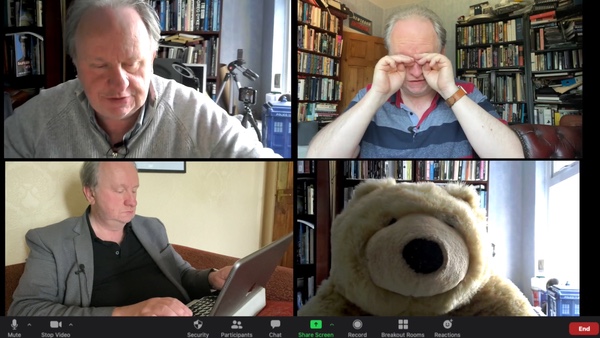So I read a poem yesterday. I mean, I read it aloud, you can hear me on the Birmingham Literature Festival’s Staying Human series of poetry. The thing is, I read the text when it was sent to me and I rather liked it, but it was when I was saying it aloud that it affected me. Smiles by Mimi Khalvati. I didn’t know her work, I’m no kind of poet, but this stabbed me.
Words. It’s not as if I can be surprised that words have this strength, I write for a living. But lately I’ve been circling back around a thought that spoken and written words are not the same thing. I love, I so deeply love, that friends have told me that they knew I’d written something because they could hear my voice in it. I adore that, I relish it, I’m proud of it.
And the other day I was listening to a podcast where the host was adamant we have to use emoji because text can’t convey emotion. If you just wrote down everything I said, this fella insisted, you couldn’t get the tone, the meaning, the subtext, the flavour.
I was wearing AirPods and walking upstairs to my office when I heard this and so my wife Angela Gallagher heard me saying to thin air, “be a better fucking writer then”.
She didn’t think it strange.
She’s heard me say it about myself often enough.
But the poem, that podcast nonsense, it’s been a bit Baader-Meinhof Phenomenon for me. Speaking of things I love, the Baader-Meinhof Phenomenon can very well be an example of the Baader-Meinhof Phenomenon. Isn’t that wonderful? You know this, even if you don’t necessarily know the term: it’s when you hear something for the very first time but then seem to hear it everywhere. I don’t mean in the way I’ve said it three times now, I mean you will hear it again today or this week or surely at most this month. You’ll notice it now, you’re aware of it, so you seem to notice it more often.
And if it’s not a phrase that I’m hearing again and again, if it’s actually a thought that keeps coming back, it’s tied to the very name Baader-Meinhof. That was and I suppose still is another name for The Red Army Faction, so it starts out as a name, it’s one particular group’s title, and then it becomes this term for something that is completely unrelated to them.
We choose what words mean. Collectively, we choose what we want words to mean. I think it’s atrocious that, for instance, there this is this unfathomable power in the universe but we’ve pretty much ignored it since we’ve all decided to give it the name “magnetism” and be done with it.
Whereas I think it’s tremendous that the word “nice” used to be such a repulsively damning word, then we made it so sweetly praising that we got repulsed by it all over again in a different direction. It’s as if the extremes of revulsion made the word into a pendulum and right now “nice” is stuck in the middle of the arc, neither good nor bad. But still faintly repulsive. It holds an echo of a previous distaste.
We decide these things. Except I think we also decide it as individuals. Or at least I hope we do, to be specific I hope that you do because otherwise you’re going to look at me very strangely now.
Okay, I walked into that one. You’re right, you’re going to look at me exactly as strangely as usual.
So I’m just going to tell you. When I hear something described as being “bucolic”, I think that means it’s horrible. It cannot mean pleasant, it must mean a rotting disease. Bucolic. You will never convince me I’m wrong.
However, this week – told you this keeps coming back – a friend described herself as being nonplussed and from the context, I knew she couldn’t mean that she was shrugging, that she didn’t particularly care one way or another. That time I actually looked up nonplussed but would you believe that every dictionary has got it wrong? I know. Inconceivable.
Whereas I accept that this is me, all me. When I was very young and just learning to read, I saw a film set in a creepy old house and there was a sign outside it that warned people “trespassing is prohibited”. I asked my sister what that pro- prohib – pribited? word was. “Forbidden,” she said.
For at least the next year I would pronounce the word “prohibited” as “forbidden”, like it had a silent f, o, r…
Tell me, what’s my job again?
